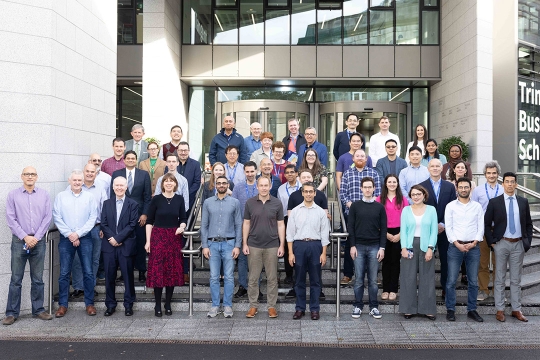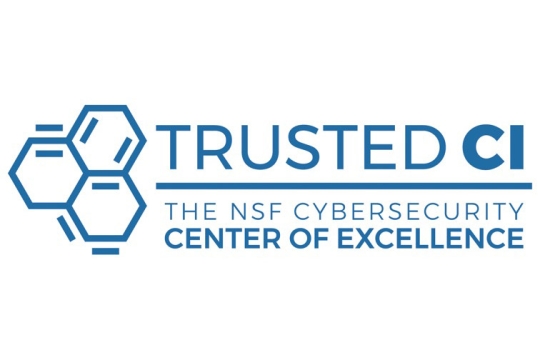
Shanchieh Yang
Research Professor, Computer Engineering
Shanchieh Yang
Research Professor, Computer Engineering
Education
BS, National Chiao-Tung University (Taiwan); MS, Ph.D., University of Texas at Austin
Bio
Dr. Shanchieh (Jay) Yang received his BS degree in Electronics Engineering from National Chaio-Tung University in Taiwan in 1995, and MS and Ph.D. degrees in Electrical and Computer Engineering from the University of Texas at Austin in 1998 and 2001, respectively. He is currently a Professor in Computer Engineering and the Director of Global Outreach for Global Cybersecurity Institute at Rochester Institute of Technology. His research focuses on advancing machine learning, modeling, and simulation for predictive cyber intelligence and anticipatory cyber defense. His research group has been supported by NSF, IARPA, DARPA, NSA, AFRL, ONR, and ARO. His earlier work introduced Variable Length Markov Models (F-VLMM), Virtual Terrain (VTAC), and Attack Social Graphs (ASG) for predictive cyber situation awareness (FuSIA, VTAC, & ViSAw). More recently, his team develops a holistic body of work that contains ASSERT to continuously learn and update emerging statistical attack models, CASCADES to simulate synthetic scenarios grounded with a theoretical understanding of adversary behaviors, and CAPTURE to forecast cyberattacks using unconventional signals in the public domain. He was a 2019 NSF Trusted CI Open Science Fellows and a 2020 NSF Trusted CI TTP Fellow. He received IEEE Region 1 Outstanding Teaching in an IEEE Area of Interest Award for outstanding leadership and contributions to cybersecurity and computer engineering in 2019. He received Norman A. Miles Award for Academic Excellence in Teaching in 2007, and was also a co-chair for IEEE Joint Communications and Aerospace Chapter in Rochester NY in 2005, when the chapter was recognized as an Outstanding Chapter of Region 1. As an innovative and collaborative leader in academia, he has also established several international partnership programs and collaborations with universities across Europe and Asia.
Select Scholarship
- A. Nadeem, S. Verwer, S. Moskal, and S. J. Yang, “Alert-driven Attack Graph Generation using S-PDFA,” in IEEE Transactions on Dependable and Secure Computing, 2021, doi: 10.1109/TDSC.2021.3117348.
- S. Moskal and S. J. Yang, “Translating Intrusion Alerts to Cyberattack Stages using Pseudo-Active Transfer Learning,” in Proceedings of IEEE Conferences on Communications and Network Security, Oct 4-6, 2021.
- C. Sweet, S. Moskal, and S. J. Yang, “On the Variety and Veracity of Cyber Intrusion Alerts Synthesized by Generative Adversarial Networks,” ACM Transactions on Management Information Systems, Special Issue on Analytics for Cybersecurity and Privacy, Vol.11, Issue 4, No. 22, December 2020, https://dl.acm.org/doi/abs/10.1145/3394503
- A. Okutan and S. J. Yang, “ASSERT: Attack Synthesis and Separation with Entropy Redistribution towards Predictive Cyber Defense”, Springer Journal on Cybersecurity, 2:15, May 2019.
- S. Moskal, S. J. Yang, and M. Kuhl, “Cyber Threat Assessment via Attack Scenario Simulation using an Integrated Adversary and Network Modeling Approach,” Journal of Defense Modeling and Simulation, Vol. 15, No.1, pp.13-29, 2018.
- S. J. Yang, H. Du, J. Holsopple, and M. Sudit, “Attack Projection for Predictive Cyber Situation Awareness,” book chapter in A. Kott, R. Erbacher, and C. Wang (Eds.), Cyber Defense and Situational Awareness, Springer, pp. 239-261, 2014.
- S. J. Yang, A. Stotz, J. Holsopple, M. Sudit, and M. Kuhl, “High Level Information Fusion for Tracking and Projection of Multistage Cyber Attacks,” Elsevier International Journal on Information Fusion, Vol. 10, No. 1, pp.107-121, January 2009.
- D. Fava, S. Byers, S. J. Yang, “Projecting Cyber Attacks through Variable Length Markov Models,” IEEE Transactions on Information Forensics and Security, Vol. 3, No. 3, pp.359-369, September 2008.
In the News
-
November 9, 2022

RIT researcher brings together cybersecurity experts from U.S., Ireland, and Northern Ireland
Professor S. Jay Yang sees collaboration as the key to combating international cybersecurity threats. That’s why the director of global outreach for RIT’s ESL Global Cybersecurity Institute is helping lead an alliance of cybersecurity researchers from the U.S., Northern Ireland, and the Republic of Ireland.
-
August 14, 2020

International students spend virtual summer at RIT for cybersecurity research program
The Cybersecurity Visiting Student Research program brought together 12 graduate and undergraduate students throughout the summer to explore new cyber research and share their cultural experiences. Visiting students came from Italy, the Netherlands, India, Taiwan, Poland, United Kingdom, and the U.S.
-
June 23, 2020

Transition to practice success story: Using machine learning to aid in the fight against cyberattacks
Trusted CI Blog features Shanchieh "Jay" Yang, professor of computer engineering and director of Global Outreach in the Global Cybersecurity Institute.